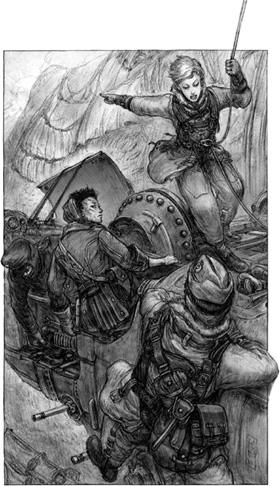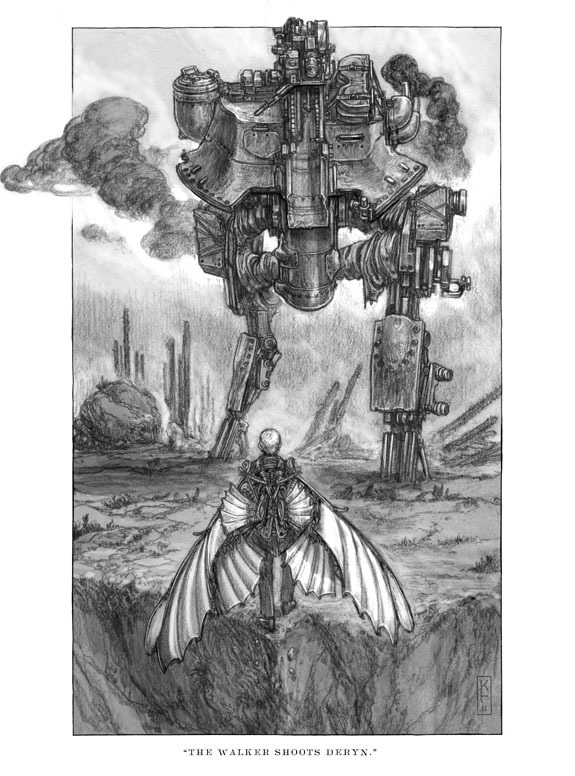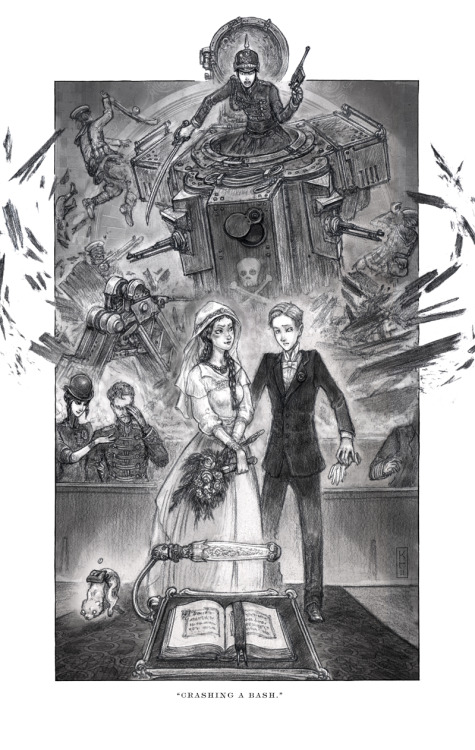

 [In as few words as I can manage (because there really isn't a way to condense so much awesome plot into a paragraph and still do it justice): The Leviathan trilogy is set during an alternate universe World War I where Central and Entente Powers are factions perusing rival technologies in war. The main characters are two teenagers: Aleksandar, the disputed heir to the Austro-Hungarian throne whose parents' death triggered the start of a world war; and a Scottish girl named Deryn, who disguises herself as a boy to enter the British Royal Air Service, and winds up serving on an airship called the Leviathan--a flying whale (yes, an actual living whale).]
[In as few words as I can manage (because there really isn't a way to condense so much awesome plot into a paragraph and still do it justice): The Leviathan trilogy is set during an alternate universe World War I where Central and Entente Powers are factions perusing rival technologies in war. The main characters are two teenagers: Aleksandar, the disputed heir to the Austro-Hungarian throne whose parents' death triggered the start of a world war; and a Scottish girl named Deryn, who disguises herself as a boy to enter the British Royal Air Service, and winds up serving on an airship called the Leviathan--a flying whale (yes, an actual living whale).]Take any one-paragraph extract, and you'd be compelled to believe this book isn't anything special. The author's use of literary devices isn't anything to shout about, yes. That I have to admit. And it's not often that I like a book with relatively plain language.
But I love this one anyway, through and through. There's a different sort of artistry to it--imagination without embellishment, unbridled, raw and honest. He makes the world his own completely, and there is something utterly enchanting about the ease with which he does so, ornamentation or no. Having a vivid description of the interior of a whale's gut isn't something you see in every book, neither is the use of bat shitting habits for war, or having a main character pilot a walker in the very tense limited-third-person point of view.
In the best way I can put it, there is some sort of fighter spirit to the novel. "Keep punching, no matter what"--because there are no shortcuts, and all you have is yourself to trust, and the few people whom you've hurt so many times you know they are your friends. No, allies.
Oh goodness; that word sends chills down my spine.
Last word of the book.
I don't remember the last time I found it within my capacity to love main characters so much. Perhaps Scott Westerfeld knew any sort of flowery language would only distance characters and events from reader--writing with realistic, detailed language (the Sensing person's take on life, hur) had the desirable effect of preventing the story from being lost in a haze of allegory and unreality. I must say, all things considered--the atmosphere, the impact of the novel, the lessons learnt--I like it more this way. A lot more. I don't know how it'd have turned out written in another author (Suzanne Collins?)'s style, but I have reason to believe this is better.
[Note: much of the story is about faith, honesty, lying and self-deception. Much better that the narrative be solid, truthful and as-is, I think?]
I can't remember when I last enjoyed a book for leaving off the figurativeness. Probably never. But it works here. I adore the characters all the more because they do not ornament what they see and believe. The characters stand out as human like I've never seen before--yet not the boring, sober, solemn sort of human.
I find, in every other book where characterisation merits the praise of "realistic", the managed realism is in service of the plot, themes and artistic vision as a whole. Yet in this book, the characterisation is The characterisation--a craft in itself, one that Westerfeld clearly enjoys exploring every corner of; it's what makes the book such a blazing delight to read. Because of how he portrays scenes, the exploits of Deryn and Alek, and their personal takes on events--extraordinary or mundane--are even more important, suddenly, than the war boiling in the background. It's positively impossible not to love them. Yes, the more disagreeable minor characters were harder to love, but I enjoyed their presence all the same.
How do I say it, I think this is the first time I'm loving a female character so acutely (no need to mention Mr. Russet-Haired Green-Eyed Sensitive Introverted Aristocrat, really; we all know any character like that picks up my fancy instantly) (But then again, don't I always love Ms. Plucky Fierce In-Your-Face Tomboy as well?). There's something about her--fighting to break from the road of fate and society has laid out for her, iron fences on either side, succeeding, yet knowing that the struggle doesn't end--not now, not ever.
[Yes, I get extremely involved when reading fiction, as you can already tell. Especially Young Adult fiction--but I suppose that's what defines YA, isn't it? Getting involved is everything; Westerfeld said so himself.]
Not only do I like Deryn more than Alek, I (oh, dare I say this?) wish I had her life. *sigh* It must be all the flying, the seas, and the countries that come in passing. The journeys that are life itself for her, and that continuous fear of losing it all, the fight to keep her identity a secret from everyone she loves--superimposed against a vivid tapestry of cultural and political threads, the nations that are swept up in the turbulence of a storm more than just metaphorical, all begun by a single rebellious couple's death.
We all know what appeals to teenagers, really--stories of extraordinary lives--fantastical, yet realistic enough to seem merely out of reach. For teens, I am to believe, books are outlets for cramped-up fantasies: the last of the childish desire to live the impossible tangled up with the more mature desire to be significant, a stewing mix stirred by the sometimes-awkward transition from childhood to adulthood. (What better main characters than teenagers in the same period of life?) This book plays on that perfectly--I'm older than the main characters yet it's blindingly exhilarating all the same, to imagine how it must feel.
Oh how it must be, to have duties aboard a living airship, passing overhead and picking up famous guests every now and then...!
---
Then of course there's the whole alternate history going. I learnt a lot more about our world history than I expected, and very suddenly--and surprisingly--gained an interest in international politics. This book made it all so easy to stomach and digest. Wonderful, really. Now I sigh whenever I watch the news and wonder about the insignificant individuals behind those momentous events.
The Steampunk element seriously appeals to me. There's something charm about it; late 19th century alternate history settings, the hazy, smoky world of cogs and dirigibles and steel machinery, and Charles Darwin's legacy of course (but more importantly, Charles Darwin's granddaughter!). And Tesla. And Churchill. And familiar names turned ten times as badass. Rival sciences. The question of the ethics of these advancements.
(And the allegorical implications--of course there's still some Literature analysis-worthy material here! Is the world meant to run like a machine? Alek needs to learn that it's really quite a mess, like the ecosystem within the Leviathan. Fate isn't mechanical.)
Finally, and very importantly, the illustrations. They are positively irresistible! And they're part of what makes me love the characters as much as I do, I reckon. Breathed such life into the people and the scenes.
The author and illustrator are really in touch with their fanbase. Which is awesome. Because it means besides epic art like this:
*swoons in fangirl happiness*
The "guy" on the right is Deryn.
And I find her positively attractive.
Of course, I also find the guy at the top attractive.
Like I said on Facebook, it's been a long time since I was this obsessed about anything.
And of course,
Bella gerant allii, tu felix Austria, nube.
(Let others wage war; you lucky Austria, shall marry.)
Beautiful...just beautiful.






